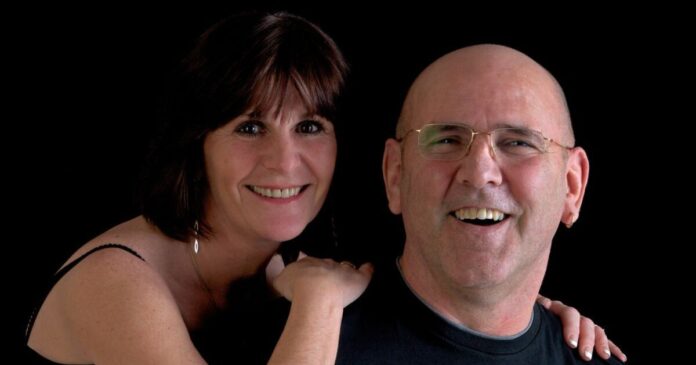

Julie and Nigel’s story is told in her book, Die Smiling (Image: Julie Casson)
A widow whose terminally ill husband feared his body “would become his coffin” is determined to share his story with every MP in the country ahead of the assisted dying vote.
Dad-of-three Nigel Casson was diagnosed with motor neurone disease (MND) aged just 52 and lived with slow-progressing symptoms for ten years.
Eventually he felt the illness was “beginning to attack his spirit” and decided to end his life at the Swiss assisted dying clinic, Dignitas.
Widow Julie, 66, said: “Because Nigel’s MND had been very, very slow [progressing], it would have been slow at the end.
“He knew that his body, in his words, would become his coffin and he wouldn’t be able to speak, scream, move, or express any desire. This is what MND does to you and he just could not bear the the thought of being trapped within his own body in that way.”
READ MORE: ‘I have terminal cancer – assisted dying would give me choice in darkest hour’

Julie is fundraising to send a copy of her book to every MP (Image: Julie Casson)
Businessman Nigel was diagnosed in 2007 following a barrage of tests after his speech became slurred.
While researching his condition, he came across the story of Craig Ewert, a former university professor with MND who travelled to Dignitas from Harrogate in 2006.
Nigel remarked that it was “not a bad way to go” but the couple never discussed the topic again until around September 2016.
Julie said her husband faced his illness “with immense good humour and practicality” for the best part of a decade. But he later experienced peaks and troughs as his condition deteriorated.
“By this time, Nigel needed 24-hour care. He had limited movement in his arms and hands,” she said. “He could make himself understood, but other than that he could do nothing for himself.
“Whilst he had coped wonderfully with the physical impact the disease had on his body, he was genuinely concerned that his spirit would be crushed in the same way that his body would be.”
When Nigel shared his wish to go to Dignitas, the couple’s three children respected it. Julie said: “Having been through what he had for 10 years and then just seeing the joy in him when he had made the decision, they could not been anything but supportive.
“Despite the risks, there was no way any one of us was not going with him.”

Julie and their children supported Nigel’s wish to go to Dignitas (Image: Julie Casson)
The family gathered “mountains of certificates and documentary evidence” about Nigel’s medical condition and an independent psychiatric report before he was approved to go to Dignitas.
Then came the “logistical nightmare of getting to Switzerland with a severely disabled man”, Julie said.
Nigel had so little muscle tone he could not sit in a plane seat. They considered hiring a private jet or taking a train, but either would be difficult without the use of a hoist.
Then, Nigel discovered an adapted camper van available for hire. Julie recalled: “We drove non-stop from Scarborough to Zurich, just over 850 miles.”
In Switzerland in April 2017, Nigel had two doctors’ visits 24 hours apart to confirm his wish to die. There was no pressure and he was repeatedly given the opportunity to change his mind, Julie said.
When the time came, he took an anti-sickness drug followed by the lethal medication and died aged 62.
Julie said: “Make no mistake we were all blubbering like idiots. Then Nigel said, ‘Right I’m ready, come on.’ He asked for a penny to pay the ferryman.
“We just held him while he died. He gave a great big smile and then slipped into unconsciousness and his breathing became heavy, like he was snoring.
“It got quieter and quieter, and he basically went to sleep. There’s no question that it was a peaceful death.”
She added: “The most dreadful thing for me and the kids, and the cruellest thing because of UK law now, is that you have to walk away and leave them there.
“All the rest of the family were denied being there at the end of his life and Nigel was cremated alone.”
Nigel’s ashes were later flown back to the UK. They were planted in the garden with forget-me-nots, scattered on a golf course and used to make jewellery for his loved ones, including a bracelet for Julie.
Julie had started a blog about the family’s experiences while caring for Nigel and developed it into a book during lockdown.
She is now fundraising to send a copy to every MP ahead of the crucial second reading of Kim Leadbeater’s assisted dying Bill on November 29.
Julie said: “I never intended to be banging a political drum but unbelievably once it was published it seemed to fall right into the heart of the current debate.”
She hopes the book, Die Smiling, will help readers understand “why he did what he did”. Julie added: “I think it would help people to think about the cruelties that people currently have to endure when they’re dying in this country.
“You spend all your life trying to control things, as a free-thinking adult, and yet at the end of your life you’re denied all choice. It’s just beyond cruel.”
After he received the green light to travel to Switzerland, Nigel stopped taking his anxiety medication and told his wife: “I’ve found the cure. I’m going to Dignitas.”
Julie said: “His whole life had quality in it from that moment. He had purpose and he was triumphant, and the change in him was so incredible because he had taken back control.
“From that point, again he was socialising, he had the lads round to watch the rugby, he had the occasional beer. He was just the man he always used to be.
“He said to me, ‘I cannot let this disease beat me. I want to die while I’m happy and while I can still smile.’ That’s what inspired the title of the book.”
Die Smiling is out now from Haythorp Books. You can support Julie’s appeal here.



















